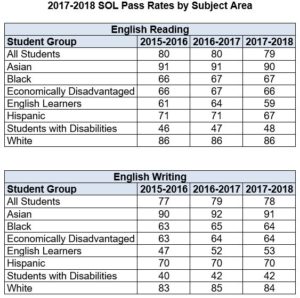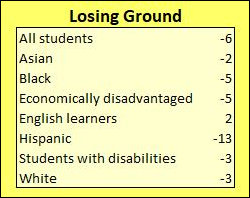 Virginia public school students backtracked slightly in their Standards of Learning test scores administered this year compared to the previous year across the board — in reading, writing, math, science, and history/social studies — according to data released today by the Virginia Department of Education (VDOE).
Virginia public school students backtracked slightly in their Standards of Learning test scores administered this year compared to the previous year across the board — in reading, writing, math, science, and history/social studies — according to data released today by the Virginia Department of Education (VDOE).
In a press release, Superintendent of Public Instruction James Lane managed to put a positive spin on the data:
Virginia has challenging standards and assessments, and students are performing at a much higher level today than when the state raised expectations six years ago. Pass rates are not the only measure of school quality. If we focus solely on annual pass rates, we miss the achievement of students who are making steady progress toward the benchmarks and the efforts of schools to address issues that directly affect learning and achievement. These factors are captured in the new accreditation system, and the ratings we will report next month will provide a more complete picture of where schools are today and where they can be enhanced in the future.
Pass rates on the 2017-2018 SOLs were “little changed” from the previous year, VDOE said. But what changed occurred was negative across the board:
- 79 percent of the students who took reading tests passed, compared with 80 percent during 2016-2017;
- 78 percent passed in writing, compared with 79 percent previously;
- 77 percent passed in mathematics, compared with 79 percent in 2016-2017;
- 81 percent passed SOL tests in science, compared with 82 percent previously; and
- 84 percent of students tested in history and social studies passed, compared with 86 percent in 2016-2017.
Bacon’s bottom line: Perhaps progress is occurring beneath the surface of tepid results. If so, I look forward to seeing the evidence. Meanwhile…
In past years, VDOE has touted progress shown by blacks and Hispanics in SOL test scores. The department was uncharacteristically silent this year. Perhaps that’s because the news is so disturbing. A comparison of 2017-18 results with 2015-17 results shows a cumulative retrogression of 7 percentage points in the pass rate across the five subject categories for all students. The slippage for Asians was the smallest (surprise, surprise), slightly worse for whites, considerably worse for blacks, and catastrophic for Hispanics. Hispanic students experienced significant declines in English reading, math, science, and history/social science. Counter-intuitively, “English learners” are the one category of student that showed gains over the two-year period. Perhaps that is explained by the fact that the category of English learners encompasses many racial/ethnic backgrounds other than Hispanic.
Hispanic backtracking would seem to be serious enough to warrant concern. There is no evidence in the VDOE press release, however, that state education officials acknowledge the problem.
School discipline and SOLs. In the past I have advanced the theory that the disciplinary policies foisted by the ACLU and Obama administration upon many Virginia school systems in the name of racial justice have made it more difficult to evict disruptive students and maintain order in some classrooms. Insofar as the perpetrators — and victims — of disrupted classes are disproportionately African-American, I have hypothesized that the academic achievement of African-American students would be negatively impacted.
(In light of the marked results for Hispanic students, I might have to expand my hypothesis to include Hispanics.)
Do this year’s test results confirm that hypothesis? The evidence is suggestive but not conclusive. Black students, according to VDOE data, eked out one percentage-point gains in English reading and writing compared to two years ago, an encouraging sign. But they fell three points in math, three points in science, and one point in history/social science. In other words, black students have lost ground overall — consistent with my hypothesis.
There are many cross-cutting factors influencing the SOL test scores of Virginia’s black students, however, so I don’t want to make too much of this data. We need to dig deeper before drawing hard-and-fast conclusions. A more meaningful hypothesis would predict that SOL test scores declined most for black students in schools with predominantly black student bodies where the new disciplinary policies have had the greatest effect. That will take a time-consuming school-by-school analysis, comparing predominantly black schools in districts that have been subjected to the therapeutic disciplinary policies to schools that have not been so afflicted.
Update: John Butcher has an update on Cranky’s Blog on SOL pass rates in the City of Richmond school district: Up one percentage point in reading, the same in science, and down two percentage points in math, three in writing, and five in history. Says he: “This is a picture of abiding failure to properly educate Richmond’s schoolchildren.”
The majority-black City of Richmond schools, by the way, performed worse than blacks statewide. As it happens, the district is one that was forced to implement the ACLU disciplinary reforms. Anecdotal evidence, I know. But at some point enough anecdotes become a trend.



